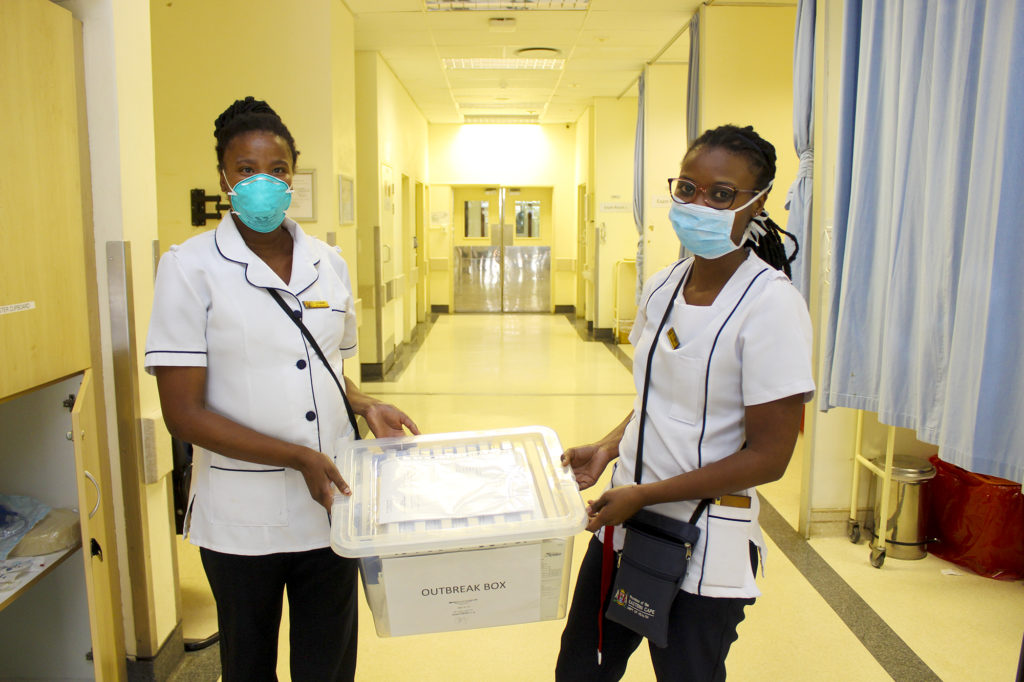Please keep strictly to your appointment at the clinic, Day Hospital or Settlers Outpatients Department. That’s the plea from the clinic and hospital heads, who have put a number of new measures in place to ensure the facilities comply with Coronavirus Covid-19 safety regulations.
Grocott’s Mail visited Settlers Hospital and Joza Clinic last week to see what preparations had been made there to manage possible Covid-19 cases and prevent the spread of the disease within Makhanda’s health facilities.
CLINICS REMAIN OPEN AS NORMAL
The clinics in Makhanda are open throughout lockdown and beyond. Health officials in Makana have pleaded with the public to stick to their scheduled appointments. This is to ensure that there are not too many people in the clinic at once.
In addition, at Joza Clinic, only a limited number of people is allowed in at a time. Community Health Workers direct patients to a waiting area at nearby Noluthando Hall and call them individually for their consultation.
If you are coming to the clinic for your appointment, please leave your children at home.
CHILDREN WILL BE VACCINATED AT HOME
Officials have requested caregivers not to bring children to the clinics for vaccinations.
“We have got teams going out to do child immunisation,” said Manager of the Health Department’s Makana Subdistrict, Mo Docrat. “We will come out to where you are.”
NEW RULES FOR SETTLERS
Head of the Local Covid-19 Response Unit, Dr Ziefried McConney, has done training sessions with staff at the clinics and Settlers Hospital to be ready for possible Coronavirus cases.
And CEO of Settlers Hospital Ms Luyanda Nqenqa is confident the hospital is prepared.
OUTPATIENTS
- There is a single queue for outpatients, with lines to show how far apart you should stand.
- Before you enter OPD, there is a screening area. If you have flu-like symptoms, or a temperature or a cough, a health worker will guide you to an isolation room for your consultation.
- There is a strict flow from here and quick handling means there is little or no queueing (provided patients stick to their appointments): from screening, patients register, then go straight to the Pharmacy and on round to a separate exit. Staff are under strict instructions to attend to patients as they arrive, so they don’t spend a lot of time sitting in the waiting area. There are five doctors working in OPD, Nqeqa said.
OUT-OF-TOWN APPOINTMENTS
Patient transport for specialist appointments in Port Elizabeth is still available and patients should book for this as usual. However, non-emergency bookings are limited, Nqenqa said.
THE MAIN HOSPITAL ENTRANCE
There is a strict flow when anyone arrives at the front entrance of the hospital and only two doors are open. The left-hand door (Casualty) is for ambulance staff, doctors and emergency patients only. The right-hand door is to the wards.
The visiting rule is one or none: only one visitor is allowed to visit a patient during visiting hours (and visitors can’t take turns). There is a spray bottle as you walk into the main entrance and you must sanitise your hands.
Taped lines on the floor show you where you must walk and bold black and white signs with arrows are meant to make sure that once you are inside, you move in one direction only. This is part of strict infection control inside the facility.
CASUALTY AND EMERGENCIES
If an emergency patient comes to Casualty and they have any symptoms that could indicate a Covid-19 infection (such as respiratory distress) they will be taken directly to an isolation room inside the Casualty section. In that room is all the equipment that doctors and nurses will need to safely examine and manage a possibly Covid-19-infected patient, including a testing kit.
Ventilators are available for acute cases, the CEO said, and critical cases would be referred to Livingstone Hospital in Port Elizabeth. However, in every section of the hospital, and in the wards, including the maternity and paediatric wards, provision had been made for suspected Covid-19 cases to be isolated while they are stabilised. Grocott’s Mail saw some of these rooms.
HEALTH WORKERS’ SAFETY
Health workers on duty in patient contact areas wore surgical masks. Gloves and plastic protective aprons were worn in OPD.
Nqenqa said the hospital had sufficient surgical masks (for general use by clinical staff), N95 masks (for confirmed Covid-19 cases), gloves, aprons and jumpsuits. These are stored and managed with the same strict protocols as scheduled substances (medicines).
Staff had all been trained in how to assess patients with suspected Covid-19 symptoms, and how to take samples for testing. They were undergoing continual training, as daily updates and new information were made available.
COMMUNICATION AND RESOURCES
There are 12 doctors working at Settlers Hospital, Nqenqa said, and the hospital is in the process of employing one more. In addition, Dr McConney, who heads the Makana Subdistrict’s Covid Response Unit, is on 24/7 standby to assist with Covid-19 management and administration in the Casualty section.
At a time when there was a countrywide shortage of hand sanitiser, Rhodes University’s Pharmacy Department stepped in to manufacture and supply this. Rhodes University had also assisted the hospital with disposable gloves, masks, gowns and overalls, Nqenqa said.
Whatsapp groups, the local Joint Operations Committee, a Settlers Hospital Outbreak Response Team and a Makana Outbreak Response Team were in constant communication and on standby.
“We are confident that we are prepared for Covid-19,” said Nqenqa. “And this has all been thanks to excellent teamwork from all our staff.”
REMEMBER
- Wash your hands regularly with soap and water for 20 seconds at a time.
- Keep a distance between you and the next person of about two metres.
- Avoid touching your eyes, mouth or nose because those parts of your face that have mucous membranes are where a virus you may have touched with your hand is most likely to come into your body.
- Keep to the Lockdown regulations and stay at home!


